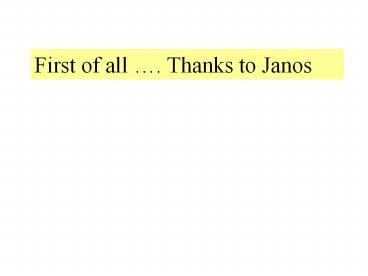First of all - PowerPoint PPT Presentation
Title:
First of all
Description:
Divide & Conquer. 1. 3. 2. Color median with 1. Recurse on right ... Divide & Conquer doesn't work! n pts. Proof of: f(n) = O(log n) Consider the Delauney Graph ... – PowerPoint PPT presentation
Number of Views:9
Avg rating:3.0/5.0
Title: First of all
1
First of all . Thanks to Janos
2
Conflict-free coloring problems
Shakhar Smorodinsky Tel Aviv University
Part of this work is joint with Guy Even, Zvi
Lotker and Dana Ron.
3
Definition of Conflict-Free Coloring
Any (non-empty) disc contains a unique color
A Coloring of pts
is Conflict Free if
4
1
3
2
4
3
3
2
1
4
What the is Conflict-Free Coloring?
A Coloring of pts
1
is Conflict Free if
1
3
2
4
3
3
2
1
5
Problem Statement
What is the smallest number f(n) s.t. any n
points can be CF-colored with only f(n)
colors? Remark We can define a CF-coloring for a
general set system (X,A) where A?P(X) i.e., a
coloring of the elements of X s.t. each set
s?A contains an element with a unique color
6
Motivation from Frequency Assignment in cellular
networks
1
mobile clients create links with base-stations
within reception radius
7
Frequency assignment
1
2
1
Power and location of clients cellular may vary
8
Problem Statement (cont)
What is the minimum number f(n) s.t. any n points
can be CF-colored with f(n) colors?
Thm f(n) gt log n
Easy n pts on a line! Discs Intervals
3
1
2
9
Points on a line (cont)
log n colors suffice (in this special
case) Divide Conquer
1
3
1
3
2
3
2
3
Color median with 1
Recurse on right and left Reusing colors!
10
CF-coloring in general case
Divide Conquer doesnt work!
Thm f(n) O(log n)
n pts
11
Proof of f(n) O(log n)
Consider the Delauney Graph i.e., the empty
pairs graph
n pts
It is planar. Hence, By the four colors Thm ?
large independent set
12
Proof of f(n) O(log n) (cont)
- IS? P s.t. IS ? n/4 and
- IS is independent
Pn
1. Color IS with 1 2. Remove IS
13
Proof of f(n) O(log n) (cont)
- IS? P s.t. IS ? n/4 and
- IS is independent!
Pn
1.Color IS with 1 2. remove IS
3. Construct the new Delauney graph and iterate
(O(log n) times) on remaining pts
14
Proof of f(n) O(log n) (cont)
- IS? P s.t. IS ? n/4 and
- IS is independent!
Pn
1.Color IS with 1 2. remove IS
5
4
3. Iterate (O(log n) times) on remaining pts
3
15
Proof of f(n) O(log n) (cont)
Algorithm is correct
Consider a non-empty disc
2
maximal color is unique
5
1
1
4
3
1
2
maximal color 3
16
Proof of f(n) O(log n) (cont)
maximal color i is unique
Proof Assume i is not unique and ignore colors lt
i
i
maximal color i
17
Proof of f(n) O(log n) (cont)
maximal color i is unique
Assume i is not unique and ignore colors lt i
i
i
maximal color i
18
Proof maximal color i is unique
Consider the ith iteration
independent
i
i
i
A third point exists
19
Proof maximal color i is unique
Consider the ith iteration
Contradiction!
i
i
i
20
Remarks
Algorithm is very easy to implement
21
What about other ranges?
CF-coloring pts w/ respect to other
ranges? Previous proof works for homothetic
copies of a convex body
Thm O(sqrt (n)) colors always suffice
22
CF-coloring pts w.r.t axis-parallel rectangles
Thm O(sqrt (n)) colors always suffice
How small is an independent set in the Delauney
graph ?
I DONT KNOW!
23
CF-coloring pts w.r.t axis-parallel rectangles
Note































